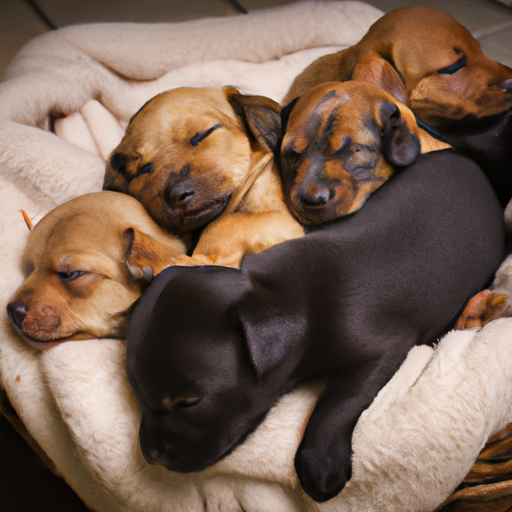As a devoted caregiver, you understand the importance of sleep for your puppy. This guide will detail everything you need to know about your puppy’s sleep habits, and how you can provide the best possible environment for them to rest.
Understanding Your Puppy’s Sleep Needs
Just like human babies, puppies need a lot of sleep. They can sleep for up to 20 hours a day, especially in the first few weeks of their life. This isn’t a cause for alarm; it’s completely normal and necessary for their development.
Puppies’ sleep cycles are not the same as adult dogs. They enter deep sleep more quickly and stay in it for longer. This deep sleep is crucial for their growth and development.
The Importance of Sleep for Puppies
Sleep plays a vital role in a puppy’s life. It’s not just about rest; it’s about growth and development. Here’s why sleep is so important for puppies:
- Physical growth: A hormone called growth hormone is primarily released during sleep. So, the more your puppy sleeps, the more they grow.
- Brain development: During sleep, puppies process their new experiences and learnings. This helps in their cognitive development.
- Energy conservation: Sleep helps puppies conserve energy, which they need for exploring their new world.
Creating a Sleep-Friendly Environment for Your Puppy
Creating the right environment for your puppy to sleep in is essential. Here are few things to consider:
- Comfortable Bedding: Just like humans, puppies need a comfortable place to sleep. Consider getting a soft and warm bed for your puppy.
- Quiet Environment: Puppies, especially when they are very young, are sensitive to noise. Try to provide a quiet and peaceful environment for them to sleep.
- Temperature: Puppies cannot regulate their body temperature as humans do. Ensure the room temperature is comfortable, neither too hot nor too cold.
Establishing a Sleep Routine
Establishing a sleep routine for your puppy can help them adjust to their new home. Routine makes puppies feel secure and can help reduce anxiety. Here’s a possible routine:
- Morning walks and play time
- Breakfast
- Nap time
- Training time
- Lunch
- Nap time
- Evening walks
- Dinner
- Bedtime
Remember, every puppy is unique, and you might need to adjust this schedule based on your puppy’s needs.
Sleep Disturbances in Puppies
Just like human babies, puppies can suffer from sleep disturbances. These can be due to various reasons such as:
- Parasites
- Physical discomfort
- Separation anxiety
- Changes in the environment
If your puppy is having trouble sleeping, it’s important to identify the cause and address it. If necessary, consult with a vet.
How to Handle Nighttime Crying
It’s common for puppies to cry at night, especially in the first few days in their new home. They might be missing their mother and littermates. Here’s how you can handle nighttime crying:
- Consistent bedtime: Establish a consistent bedtime and stick to it.
- Pre-bedtime activities: Engage your puppy in activities before bedtime to tire them out.
- Ignore the crying: If your puppy cries for attention, it’s important to ignore it. Otherwise, they will learn that crying gets your attention.
FAQ
Q: How much sleep do puppies need?
A: Puppies can sleep for up to 20 hours a day, especially during their first few weeks.
Q: Why is my puppy having trouble sleeping?
A: There can be various reasons for this, including physical discomfort, separation anxiety, or changes in the environment. If your puppy is having trouble sleeping, consider consulting with a vet.
Q: How can I help my puppy sleep through the night?
A: Establishing a consistent bedtime, engaging your puppy in pre-bedtime activities, and ignoring nighttime crying can help your puppy sleep through the night.
Remember, you as a caregiver play a significant role in your puppy’s sleep habits. By understanding their sleep needs and creating an optimal environment, you can ensure your puppy grows into a healthy and happy dog.



